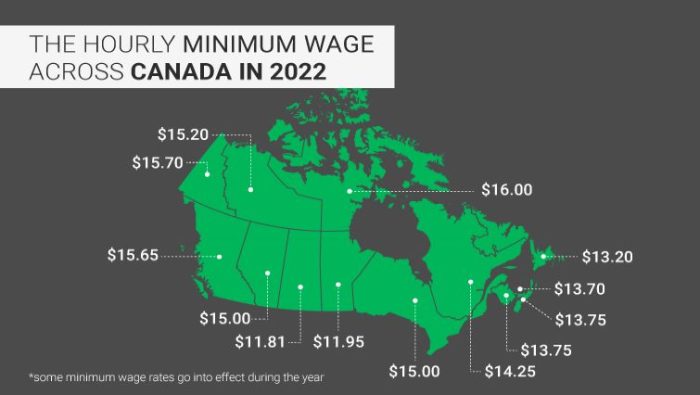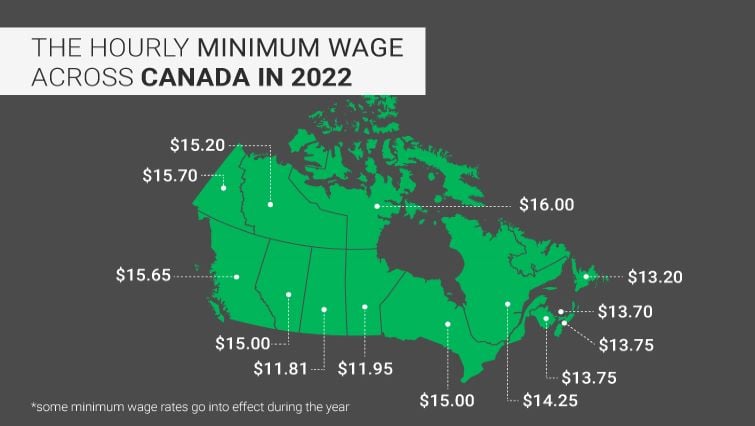The 2022 Minimum Wage in Canada
 Publié le 1 April 2022
Publié le 1 April 2022
The 2022 minimum wage in Canada differs in each province and territory. With increases set to go into effect throughout the year, it’s important for job seekers to know where their skills will be valued.
A minimum wage is the minimum amount of pay that employers can offer their employees. The 2022 minimum wage in Canada is different in each province and territory, and the Federal Government has its own minimum wage for its employees. With every province and territory setting their own 2022 minimum wage through legislation, it means that increases happen throughout the calendar. As job seekers and employees grapple with the rising Consumer Price Index and inflation, it’s important that they remain fully aware of these 2022 minimum wage increases.
A Brief History of the Minimum Wage in Canada
The first province to mandate a minimum wage in Canada was Manitoba, where it became law in 1918. Within two years, five additional provinces had passed legislation creating a minimum wage, including British Columbia and Nova Scotia. The final province to establish a minimum was Prince Edward Island in 1960. It is important to note that these early minimum wage laws did not apply to every single job role within the province, and many also established different minimum wages based on the gender of employees, — a practice that was not fully abolished until 1974.
What Is the Consumer Price Index?
According to the definition from Statistics Canada, the Consumer Price Index (CPI) “represents changes in prices as experienced by Canadian consumers. It measures price change by comparing, through time, the cost of a fixed basket of goods and services.” There are currently seven provinces/territories in Canada which link their minimum wage rates to the Consumer Price Index. In theory, this results in a minimum wage that better reflects the true cost of living and housing. With the Consumer Price Index and inflation hitting the highest rates in over 30 years, it remains to be seen if projected increases to the 2022 minimum wage in Canada will be able to address the needs of workers across the country.
What Is The Alternative Minimum Wage?
There are certain provinces which have multiple minimum wages that apply to different industries and job types, meaning that the average minimum wage in Canada in 2022 is affected by both job type and location.
Typically, these alternative minimum wages allow business owners to pay people working in certain job types – commonly roles where they can receive tips such as liquor and food servers and bartenders – a lower wage because they have the possibility to earn additional gratuities. British Columbia eliminated their alternative minimum wage in 2021, and Ontario is following suit this year. Quebec still has an alternative minimum wage for servers, while Alberta allows a lower alternative minimum wage for students under the age of 18.
The 2022 Minimum Wage in Canada – Per Hour by Province
- British Columbia: $15.65
- Alberta: $15.00
- Saskatchewan:
$11.81$13.00 - Manitoba:
$11.95$13.50 - Ontario:
$15.00$15.50 - Quebec: $14.25
- New Brunswick: $13.75
- Nova Scotia: $13.60
- Prince Edward Island: $13.70
- Newfoundland and Labrador:
$13.20$13.70 - Yukon: $15.70
- Northwest Territories: $15.20
- Nunavut: $16.00
- Federal: $15.55

British Columbia – $15.65 per hour effective June 1st, 2022
The 2022 minimum wage in British Columbia is $15.65 per hour, effective June 1st, 2022. This is a $0.45 raise, and a 2.9% increase of the minimum wage from $15.20 per hour in 2021. British Columbia was the third province or territory in Canada to offer a minimum wage of $15.00 or higher. The provincial government has promised to tie the minimum wage in British Columbia to the increasing rate of inflation, and the latest increase reflects this commitment. It has now been one full year since British Columbia eliminated the alternative minimum wage for certain job roles, and the new minimum wage applies to every worker in the province.
Alberta – $15.00 per hour
The 2022 minimum wage in Alberta is $15.00 per hour. This rate has remained unchanged since the last increase in 2018, when Alberta became the first province to mandate a $15.00 per hour minimum wage. Alberta is also maintaining the alternative minimum wage of $13.00 per hour for students under the age of 18, with certain conditions apply. Certain job roles are exempt from minimum wage standards in the province, including real estate brokers, certain salespersons, non-profit counsellors and additional roles.
Saskatchewan – $11.81 per hour $13.00 per hour effective October 1st, 2022
The 2022 minimum wage in Saskatchewan is $11.81 per hour. While there is no official alternative minimum wage in Saskatchewan, certain job roles are not required to be paid at this rate including farm and ranch labourers, certain care providers, babysitters, and more. The minimum wage in Saskatchewan was last raised in October 2021, increasing 3.14% from $11.45 per hour. Even after this relatively recent increase, the 2022 minimum wage in Saskatchewan is the lowest in any Canadian province or territory. The province links its minimum wage to the Consumer Price Index from the previous year, with changes scheduled to take effect in October. This means the 2022 minimum wage in Saskatchewan could potentially rise in October 2022, but no formal announcements have been made.
UPDATE: The 2022 minimum wage in Saskatchewan is now $13.00 per hour, effective October 1st, 2022. This is a 10.07% increase, designed to help workers in the province addressing growing inflation and increasing living costs. The provincial government has announced plans to further raise the Saskatchewan minimum to $14.00 in 2023 and $15.00 per hour in 2024. Despite this relativity large increase, the minimum wage in Saskatchewan is still the lowest in any Canadian province.
Manitoba – $11.95 per hour $13.50 per hour effective October 1st, 2022
The 2022 minimum wage in Manitoba is $11.95 per hour. It was last raised in October of 2021, increasing 0.4% from $11.90. Certain job roles are exempt from minimum wage requirements, including domestic workers who work under 12 hours per week and people in an approved provincial or federal training program. Despite being the very first province in the entire country to have legislated a minimum wage, this is the second lowest 2022 minimum wage in any Canadian province or territory.
UPDATE: The 2022 minimum wage in Manitoba is now $13.50 per hour, effective October 1st, 2022. This is an increase of $1.55 per hour, an almost 13% raise and is substantially more than the previous raise of $0.25 in 2021. The provincial government has also announced two additional increases for next year, which will raise the hourly minimum wage in Manitoba to $14.15 in April 2023 and $15.00 in October 2023.
Ontario – $15.00 per hour $15.50 per hour effective October 1st, 2022
The 2022 minimum wage in Ontario is $15.00 per hour. This rate came into effect on January 1st, 2022, and increased the minimum wage 4.52% from $14.35 per hour, which had been in effect since October 2021. The alternative minimum wage for liquor servers was also eliminated, increasing their minimum wage 19.5% from the previous $12.55 per hour. The provincial government later introduced additional legislation to apply the $15.00 minimum wage to people working through gig-based apps as part of a larger effort to support workers now working remotely. The alternative 2022 minimum wage for students remains in effect, while being raised to $14.10 per hour.
UPDATE: The minimum wage in Ontario is $15.50 per hour, effective October 1st, 2022. This is the second increase of the year due to the increasing CPI, and the minimum wage rate has been raised by $1.15 from $14.35 in 2021. This wage rate applies to all employees in Ontario, including those who were previously earning the alternative minimum wage. Ontario now offers the second-highest minimum wage of any Canadian province.
Quebec – $14.25 per hour effective May 1st, 2022
The 2022 minimum wage in Quebec is $14.25 per hour, effective May 1st, 2022. This is a 5.5% increase and a $0.75 raise from the 2021 minimum wage of $13.50 per hour. The 2022 alternative minimum wage in Quebec for workers who receive tips will also rise to $11.40 from $10.80. This change is expected to impact over 301,000 workers in various in-demand job roles across the province.
New Brunswick – $12.75 per hour effective April 1st, 2022 / $13.75 per hour effective October 1st, 2022
The 2022 minimum wage in New Brunswick will increase twice over the course of this year. Effective April 1st, 2022, the 2022 minimum wage will be 12.75 per hour, before rising again to $13.75 per hour effective October 1st, 2022. This means that the minimum wage will increase by $2 in the span of 16 months, partially due to being linked to the Consumer Price Index, and will move New Brunswick from having the lowest minimum wage in the Maritime provinces to the highest.
Nova Scotia – $13.35 effective April 1st, 2022 / $13.60 per hour effective October 1st, 2022
The 2022 minimum wage in Nova Scotia will rise twice, to $13.35 per hour effective April 1st, 2022 and then $13.60 per hour effective October 1st, 2022, similar to New Brunswick. With the minimum wage linked to the Consumer Price Index, Nova Scotians earning minimum wage will enjoy a $0.40 raise, increasing 3% from $12.95 per hour in 2021. The minimum wage in Nova Scotia is scheduled to rise twice more in the next two years, reaching $15.00 per hour in April 2024.
Prince Edward Island – $13.70 per hour effective April 1st, 2022
The 2022 minimum wage in Prince Edward Island is $13.70 per hour, effective April 1st, 2022. The wage rate is linked to the Consumer Price Index, and will result in a $0.70 raise from $13.00 per hour. PEI, the smallest Canadian province, will offer the highest minimum wage in Atlantic Canada until October, when it will be passed by New Brunswick.
Newfoundland and Labrador – $13.20 per hour effective April 1st, 2022 / $13.70 per hour effective October 1st, 2022
The 2022 minimum wage in Newfoundland and Labrador is $13.20 per hour effective April 1st, 2022. This is a $0.45 raise from $12.75 in 2021, with possible additional future raises to be announced during the spring.
UPDATE: The provincial government of Newfoundland and Labrador has announced a series of minimum wage increases taking place over the next 12 months. Effective October 1st, 2022, the minimum wage in Newfoundland and Labrador is $13.70 per hour, a 3.8% increase. There are two additional increases currently scheduled, a raise to $14.50 on April 1st, 2023 and to $15.00 on October 1st, 2023. This means that the minimum wage in Newfoundland and Labrador is rising a total of $1.80 — 13.6% — in the span of 18 months.
Yukon – $15.70 per hour effective April 1st, 2022
The 2022 minimum wage in the Yukon is $15.70 per hour effective April 1st, 2022. Rising $1.85 from a rate of $13.85 in 2021, this is one of the largest minimum wage increases in Canada. This increase is directly tied to a 3.3% increase in the the 2021 Consumer Price Index for Whitehorse, the capital of the Yukon.
Northwest Territories – $15.20 per hour
The 2022 minimum wage in the Northwest Territories is $15.20 per hour. Coming into effect in September 2021, this was the first increase of the minimum wage in the Northwest Territories in 3 years. The 12.9% increase in the minimum wage meant a $1.74 raise for minimum wage workers in the territory. There are no scheduled minimum wage increases in the Northwest Territories for the remainder of 2022.
Nunavut – $16.00 per hour
The 2022 minimum wage in Nunavut is $16.00 per hour. Nunavut offers the highest hourly minimum wage of any province or territory in Canada, but also has one of the highest costs of living. The territorial government has announced plans to study additional minimum wage increases starting this spring as the CPI hits a 30 year high.
Federal – $15.55 per hour effective April 1st, 2022
The 2022 minimum wage for job roles in the Canadian Federal Government is $15.55 per hour effective April 1st, 2022. This is a $0.55 raise and a 3.6% increase over the 2021 federal minimum wage of $15.00 per hour. People employed by the Federal Government will earn this rate regardless of which province or territory in which they work. Meaning that a Federal employee living in Ontario will still earn $15.55 per hour, even though the 2022 minimum wage in Ontario is $15.00 per hour.
The 2022 minimum wage in Canada differs in each province and territory. The majority of which have scheduled increases to their 2022 minimum wages taking effect throughout the year. Job seekers should be aware of minimum wage increases as they seek employment in a job role and field of their choosing.







